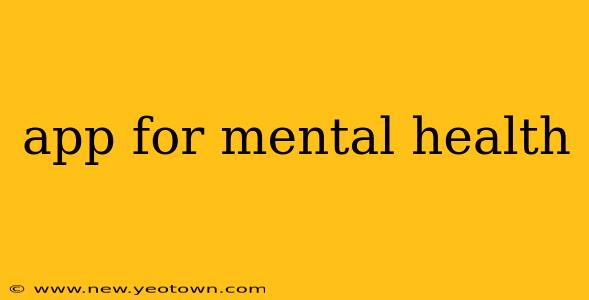Life's a rollercoaster. One minute you're soaring high, the next you're plummeting into the depths of stress, anxiety, or just feeling…blah. In today's fast-paced world, prioritizing mental wellbeing can feel like an impossible task, but it doesn't have to be. Enter the world of mental health apps – your pocket-sized companions on the journey to a healthier, happier you. This isn't about replacing professional help; think of these apps as supportive tools to complement your existing strategies. Let's dive into the landscape of mental wellness apps and explore how they can make a difference.
What are the best mental health apps available?
There's no one-size-fits-all answer here. The "best" mental health app depends entirely on your individual needs and preferences. Some focus on mindfulness and meditation, others on cognitive behavioral therapy (CBT), and still others offer a combination of techniques. Factors like ease of use, features, and cost also play a vital role. Some apps are completely free, while others offer freemium models or subscription-based access to premium content. Exploring different apps and trying out their free versions is the best way to find your perfect match.
What kind of mental health issues can apps help with?
Many mental health apps can provide support for a range of issues, including:
- Stress and Anxiety: Apps often incorporate relaxation techniques like guided meditations, breathing exercises, and progressive muscle relaxation to help manage stress and anxiety symptoms.
- Depression: Some apps offer CBT-based exercises, mood tracking tools, and personalized support to help individuals navigate depressive episodes. It's crucial to remember that these apps are not a replacement for professional treatment, but they can be a valuable supplement.
- Sleep Problems: Many apps feature sleep meditations, soundscapes, and sleep tracking tools designed to improve sleep quality and address insomnia.
- Mindfulness and Self-Awareness: Cultivating mindfulness is a core component of many mental health apps. Through practices like meditation and journaling, users can increase self-awareness and develop healthier coping mechanisms.
Are mental health apps safe and effective?
The safety and effectiveness of mental health apps vary widely. Reputable apps often employ licensed therapists or mental health professionals in their design and development. However, it's crucial to research an app thoroughly before using it, paying attention to user reviews and the app's privacy policy. Always remember that these apps are tools, not cures. They should complement, not replace, professional help when needed.
How can I choose the right mental health app for me?
Choosing the right app involves careful consideration. Here's a step-by-step guide:
- Identify your needs: What specific mental health challenges are you facing? Are you looking for stress reduction, improved sleep, or support for a more specific condition?
- Read reviews: Check app store reviews to get an idea of other users' experiences. Look for patterns in positive and negative feedback.
- Consider features: Does the app offer features that align with your needs? Look for things like guided meditations, CBT exercises, journaling prompts, or mood tracking.
- Check privacy policies: Understand how the app collects and uses your data. Choose apps with transparent and robust privacy policies.
- Start with a free trial: Many apps offer free trials or freemium models, allowing you to test the app before committing to a paid subscription.
Do mental health apps replace therapy?
Absolutely not. Mental health apps are valuable tools, but they are not a replacement for professional therapy or counseling from a licensed professional. If you're struggling with a mental health condition, seeking professional help is essential. These apps can be a helpful supplement to therapy, but they should never be considered a sole treatment option.
How much do mental health apps cost?
The cost varies greatly. Many offer free versions with limited features, while others require a subscription fee for access to premium content. Some apps operate on a freemium model, offering a mix of free and paid features. Always check the app's pricing before downloading.
My journey into the world of mental health apps began with a sense of trepidation, but I've found that they've become invaluable allies in managing daily stress. Remember to approach them with realistic expectations, prioritizing your mental well-being, and seeking professional help when needed. The path to mental wellness is a personal journey, and these apps can simply be another tool in your toolbox.

